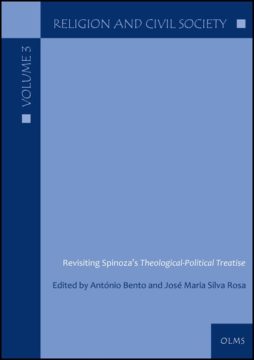Many authors have already observed that the Tractatus Theologico-Politicus of Baruch Spinoza was, in its time, the most discussed and most vehemently refuted book. Indeed, at the dawn of the Enlightenment, and almost until the end of the XIX century, Spinoza’s Theological-Political Treatise was an assertive and powerful appeal to freedom of expression and thought, a bold claim of religious tolerance and freedom of conscience in a Europe that was unaccustomed to the exercise of free thought. But, what is after all the subject of the Theological-Political Treatise, a book maligned for so long and by so many as ultra pestilential and immoral? The present volume, collecting a bunch of essays by notable European scholars, attempts to address some of the problems created by the broad spectrum of topics included in Spinoza’s Theological-Political Treatise.
Es ist schon oft bemerkt worden, dass Baruch Spinozas Tractatus Theologico-Politicus zu seiner Zeit das meist diskutierte und am heftigsten bekämpfte Buch war. Am Beginn der Aufklärung und fast bis zum Ende des 19. Jahrhunderts war Spinozas Theologisch-Politischer Traktat ein nachdrücklicher und kraftvoller Ruf nach der Freiheit des Redens und Denkens, eine unerschrockene Forderung nach religiöser Toleranz und Gewissensfreiheit in Europa, für das die Ausübung des freien Denkens noch ganz ungewohnt war. Doch worum geht es eigentlich im Theologisch-Politischen Traktat, der so lange und von so vielen als ein äußerst schädliches und unmoralisches Buch verteufelt wurde? Der vorliegende Band, eine Sammlung von Essays namhafter europäischer Gelehrter, widmet sich einigen der Probleme, die sich aus dem breiten Spektrum der Themen in Spinozas Theologisch-Politischem Traktat ergeben.
- Veröffentlicht am Samstag 2. November 2024 von Olms, Georg
- ISBN: 9783487148892
- 340 Seiten
- Genre: Aufklärung, Hardcover, Philosophie, Renaissance, Softcover
